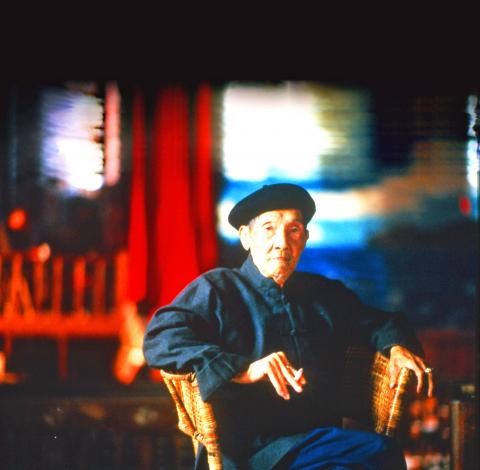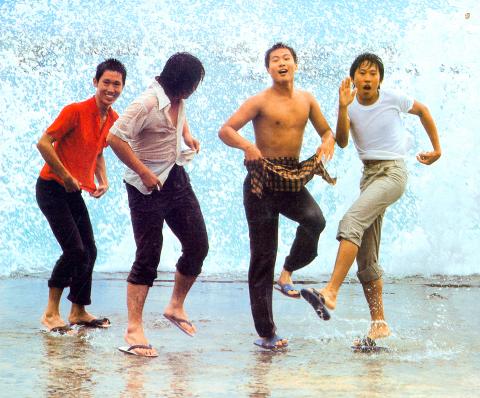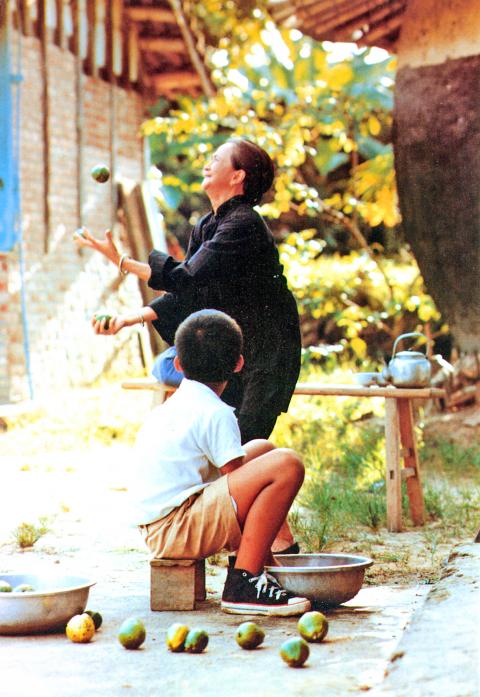The year was 1991. American film critic Jonathan Rosenbaum was experiencing his first authentic night out in Taipei at a late night karaoke party hosted by renowned Taiwanese film director Hou Hsiao-Hsien (侯孝賢). Fueled by bottles of cognac and a generous supply of betel nuts, the duo belted out Beatles songs until 3am before stumbling home.
Having reviewed Dust in the Wind (戀戀風塵, 1986) and A City of Sadness (悲情城市, 1989) for the Chicago Reader, long-time film critic Rosenbaum was no stranger to Hou’s work. But being in Taipei for the Asia-Pacific Film Festival gave him a better appreciation of the local culture, history and setting.
“I was able to spend my 19 days there less as a tourist than as a part of everyday life in Taipei,” said Rosenbaum, who was in New York this past week for the retrospective “Also Like Life: The Films of Hou Hsiao-hsien” at the Museum of the Moving Image.

Photo Courtesy of Center for Moving Image Arts, Bard College
TAIWANESE NEW WAVE
The early 1990s was a crucial time for a film critic to be visiting Taiwan since the industry had recently undergone major changes. In contrast to kungfu and melodrama, the New Wave of the 1980s introduced an element of realism to Taiwanese cinema akin to Italian neorealism, and Hou was the central figure driving the movement.
Rather than presenting viewers with drawn-out fight scenes or heart-wrenching tragedies, films of this period dealt with the everyday realities of working class life in Taiwan. Concentrating on such banalities may not seem too exciting, but the movement was groundbreaking because up until then, the films being produced lacked an emphasis on Taiwanese history.

Photo Courtesy of Center for Moving Image Arts, Bard College
As Rosenbaum told the Taipei Times, “Taiwanese history is such a taboo subject that when it gets ‘discovered’ it’s very important.”
RETROSPECTIVE
Organized by Taiwan’s Ministry of Culture, the Taiwan Film Institute, Taipei Cultural Center in New York and the Center for Moving Image Arts at Bard College, the touring retrospective “Also Like Life” is currently in New York until Oct. 17 before making stops in other US cities.

Photo Courtesy of Center for Moving Image Arts, Bard College
Film critics and organizers of the retrospective are hoping that it will raise awareness of Taiwanese history amongst American audiences.
“Although Hou is very widely recognized among American cinephiles as a master, his mainstream reputation in the US remains unfortunately limited, because of the low distribution of his films and the confused and partial understanding in the US of Taiwanese history,” Rosenbaum said.
Richard Suchenski from Bard College also noted that the distribution of foreign art cinema in North America over the past decade in particular has been increasingly sparse. As the main organizer of the retrospective, he spent two years searching for and compiling Hou’s films on the best possible 35mm prints in preparation for the retrospective.
Suchenski told the Taipei Times that “this is a very rare opportunity to see these remarkable films projected and I am thrilled that so many people are taking advantage of it.”
He added that the screenings have been attracting “very diverse audiences that include many young cinephiles.”
‘THE SANDWICH MAN’ AND THE TAIWANESE IDENTITY (CRISIS)
The Oct. 5 screening of The Sandwich Man (兒子的大玩偶, 1983) drew a diverse mixture of film buffs. The majority of viewers were not Taiwanese. The choice of film was interesting because Hou’s segment of the three-part film is almost entirely in Hoklo (commonly known as Taiwanese). Furthermore, it presents viewers with a heads-on confrontation of the question of what it means to be Taiwanese.
A compilation of three vignettes from Hou and directors Tseng Chuang-hsiang (曾壯祥) and Wan Jen (萬仁), The Sandwich Man explores the humdrum experience of working class life in 1960s Taiwan with a simplicity that is beautiful and intriguing.
As Suchenski said, “salient features of Hou’s cinema include elegantly staged long takes and the precise delineation of quotidian life.”
In other words, each vignette is not so much about dramatizing the tragic dimensions of poverty, but rather exploring how the characters find ways to be happy despite their seemingly abject condition living in “exile.” In doing so, the subjects begin to form a new social identity — a Taiwanese identity.
“The Sandwich Man expresses the existential dilemma of being Taiwanese better than any other film — the problem that arises from pretending to be someone else temporarily and then finding that this temporary identity had become one’s main social identity,” Rosenbaum said.
Hou may not be as famous as Ang Lee (李安) is in the US, but his films, as the retrospective has shown, have played a pivotal role in the redefinition of Taiwanese identity.
As for the drunken karaoke scene which Rosenbaum recalled from his 1991 visit — it could easily have been set in present day Taipei, except the cognac would be replaced with something more local, perhaps Taiwan Beer.

March 10 to March 16 Although it failed to become popular, March of the Black Cats (烏貓進行曲) was the first Taiwanese record to have “pop song” printed on the label. Released in March 1929 under Eagle Records, a subsidiary of the Japanese-owned Columbia Records, the Hoklo (commonly known as Taiwanese) lyrics followed the traditional seven characters per verse of Taiwanese opera, but the instrumentation was Western, performed by Eagle’s in-house orchestra. The singer was entertainer Chiu-chan (秋蟾). In fact, a cover of a Xiamen folk song by Chiu-chan released around the same time, Plum Widow Missing Her Husband (雪梅思君), enjoyed more

Last week Elbridge Colby, US President Donald Trump’s nominee for under secretary of defense for policy, a key advisory position, said in his Senate confirmation hearing that Taiwan defense spending should be 10 percent of GDP “at least something in that ballpark, really focused on their defense.” He added: “So we need to properly incentivize them.” Much commentary focused on the 10 percent figure, and rightly so. Colby is not wrong in one respect — Taiwan does need to spend more. But the steady escalation in the proportion of GDP from 3 percent to 5 percent to 10 percent that advocates

From insomniacs to party-goers, doting couples, tired paramedics and Johannesburg’s golden youth, The Pantry, a petrol station doubling as a gourmet deli, has become unmissable on the nightlife scene of South Africa’s biggest city. Open 24 hours a day, the establishment which opened three years ago is a haven for revelers looking for a midnight snack to sober up after the bars and nightclubs close at 2am or 5am. “Believe me, we see it all here,” sighs a cashier. Before the curtains open on Johannesburg’s infamous party scene, the evening gets off to a gentle start. On a Friday at around 6pm,

A series of dramatic news items dropped last month that shed light on Chinese Communist Party (CCP) attitudes towards three candidates for last year’s presidential election: Taiwan People’s Party (TPP) founder Ko Wen-je (柯文哲), Terry Gou (郭台銘), founder of Hon Hai Precision Industry Co (鴻海精密), also known as Foxconn Technology Group (富士康科技集團), and New Taipei City Mayor Hou You-yi (侯友宜) of the Chinese Nationalist Party (KMT). It also revealed deep blue support for Ko and Gou from inside the KMT, how they interacted with the CCP and alleged election interference involving NT$100 million (US$3.05 million) or more raised by the